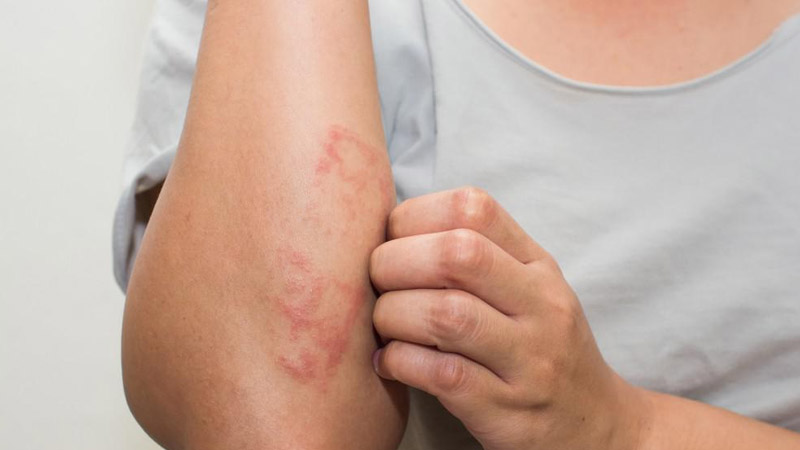No one likes the feeling of dry, itchy skin. It can be irritating and uncomfortable, and sometimes even painful. If you’re dealing with dry skin, you’re probably looking for ways to relieve the discomfort and get your skin back to normal.
Here are a few tips for coping with dry skin and relieving the itch factor.
The Itch Factor – what is it and why does it happen?
Have you ever noticed that sometimes when you scratch an itch, it only gets worse instead of better? It turns out this phenomenon is a real thing – scientists call it the “itch factor” and understanding why it happens can help us find ways to manage our skin irritation. In short, the act of scratching your skin stimulates nerve receptors and breaks up their normal function; this in turn causes an increase in sensitivity and potential for a stronger reaction to even light touches on those areas.
The key takeaway here is to not over-scratch! Instead, try using some other means of relief such as applying a cool compress or resisting the urge entirely. With practice, we can learn how to manage this effect and keep our skin irritation at bay.
Coping with dry skin – tips and tricks to help relieve the discomfort
Dealing with dry skin can be a real nuisance. If you’re experiencing flaky and parched skin, there are some easy tricks that can help your skin feel better in no time. The most important thing when it comes to soothing dryness is to stay hydrated – both on the outside and the inside! Be sure to drink plenty of water throughout the day and apply a quality moisturizing lotion directly afterward.
Also, use gentle cleansers on your face, since strong products can aggravate dryness even more. As far as exfoliation goes, steer clear of harsh scrubs and opt for something milder. All in all, just remember: take care of yourself by drinking plenty of fluids and consistently applying lotion – dry skin won’t stand a chance against your healthy habits!

The importance of moisturizing – how to do it effectively
One of the most overlooked aspects of a skincare routine is moisturizing. Regularly moisturizing your skin can do wonders, from keeping it hydrated and plump to helping control oil production and reducing fine lines. The first step to effective moisturizing is finding the right product for your skin type. Daily moisturizers should contain natural, nourishing ingredients such as argan oil, aloe vera, and honey which will leave your skin feeling hydrated and soft.
For extra protection against environmental factors such as pollution, use a heavier occlusive cream at night that seals in moisture. Don’t forget that common areas like elbows, feet, and hands deserve a little extra attention too! Applying an emollient cream or ointment once a week can help keep those areas supple and smooth instead of dry and flaky. In short, just a few moisturizing steps each day can hugely benefit the overall health of your complexion.
Home remedies for dry skin – things you can find around the house to help
With the colder winter months upon us, many of us environmental enthusiasts are looking for home remedies for dry skin. Instead of relying on lots of costly creams and lotions that can contain potentially harsh chemicals, why not look around your own house for items you can use? Olive oil makes a fantastic facial moisturizer; honey’s antibacterial and anti-inflammatory properties make it a great ingredient to add to your face routine.
Yogurt is packed with probiotics and proteins to give you smooth, supple skin. Once you’ve created your at-home remedy, turn off the lights and apply it before bed–you won’t believe how soft your face will feel in the morning!
When to see a doctor – when should you seek medical attention for your dry skin?
If you’re suffering from dry skin, it’s important to determine when to seek medical attention. An easy way to gauge how serious the issue is is to take note of if the skin is cracking or bleeding. If so, then it’s definitely time to make an appointment with your doctor, as this could potentially lead to infections and require treatment.
Dry skin can also be caused by certain diseases and conditions such as eczema or psoriasis, so if the problem persists for more than a few weeks and regular moisturizing doesn’t help, then that warrants an appointment being made too. Ultimately, it’s best to listen to your body, as you know what seems unusual or concerning more than anyone else!
All in all, it’s essential to understand the effects of dry skin and take the necessary steps to manage it. The itch factor is a very real discomfort that affects many people, but there are manageable ways to soothe the itch and reduce dryness. Keeping moisture levels up with moisturizers and other techniques like exfoliating are effective methods to prevent further damage. Home remedies such as oil-based creams and honey masks can provide temporary comfort.
However, it is still very important to know when you should seek medical attention as sometimes rashes or infections can actually be signs of more serious conditions requiring specialized treatments or medications for alleviation. Thankfully, with some diligence, knowledge, and extra caution, we can get that healthy skin we’ve been longing for!



